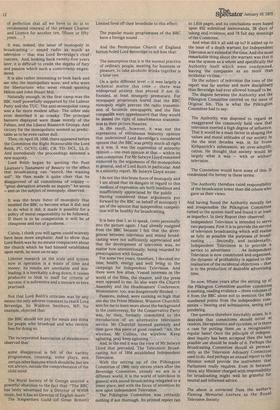Th . Spee e tator January 10;1975
to 1,610 pages, and its conclusions were based upon 852 submitted memoranda, 38 days of taking oral evidence, and 78 full day meetings of the Commitee.
And what did it all add up to? It added up to the issue of a death warrant for Independent Television as it existed at the time. And the most remarkable thing about the warrant was that it was the system as a whole and specifically the Authority itself which were condemned, leaving the companies as no more than incidental victims.
On the subject of television the tone of the report was far sterner and more disciplinary than Beveridge had ever allowed himself to be.
The dispute between the Authority and the Pilkington Committee centred on the issue of Original Sin. This is what the Pilkington Committee had to say:
The Authority was disposed to regard as exaggerated the commonly held view that television exerted a high degree of influence. That it would be a main factor in shaping the values and moral attitudes of our society in the the next decades was, in Sir Ivone Kirkpatrick's submission, an over-simplification. He thought that society would be largely what it was — with or withoW .television.
The Committee would have none of this. It condemned the heresy in these terms: The Authority therefore rated responsibility of the broadcaster lower than did others who gave us their views.
And having found the Authority morally lax and irresponsible the Pilkington Committee turned to the system itself and found it at least as imperfect. In their Report they observed:
Independent Television is intended to serve two purposes. First it is to provide the service of television broadcasting which will realise as fully as possible the purposes of broadcasting . . . Secondly, and incidentally, Independent Television is to provide a service to advertisers . . . As Independent Television is now constituted and organised, the dynamic of profitability is applied to the realisation of the incidental objectives — that is to the production of desirable advertising time.
So now, fifteen years after the setting up of the Pilkington Committee another committee is meeting, reading evidence — three volumes of it from the BBC alone not to mention the 585 numbered points from the independent companies — hearing oral submissions, seeing and pondering. One question therefore inevitably arises. Is it desirable that committees should occur at random, like epidemics and cyclones, or is there a case for putting them on a recognisably regular basis? Once the principle of independent inquiry has been accepted then the best possible use should be made of it. Perhaps the Broadcasting Committee should sit permanently as the Television Advisory Committee used to do. And perhaps an annual report to the Minister woUld provide the instrument that Parliament really requires. Even in between times, any Minister charged with responsibility for broadcasting might well be grateful for neutral and informed advice.
The above is extracted from the author's Fleming Memorial Lecture to the Royal Television Society


























 Previous page
Previous page